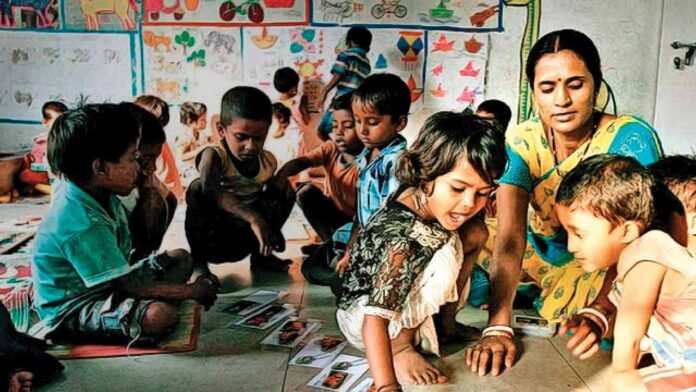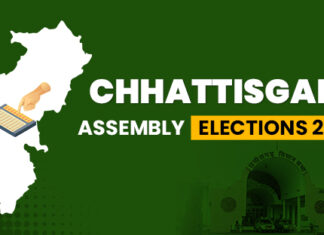The Covid-19 pandemic brought to surface some of the raw truths about educational deprivation that are usually invisible, forgotten or considered to be the thing of past: Long-distance distress migration of families, many with children; anxiety over the loss of mid-day-meals; families taking extraordinary measures to arrange for a device for online classes; support staff and teachers losing their jobs.
Amidst the pandemic, school closures, and uncertainties of re-opening, the National Education Policy 2020 was approved by the union cabinet. Going by the document that is publicly available, the policy continues to invisibilize the working classes and disadvantaged communities.
Peppered with buzz words that are used by international development agencies, the NEP 2020 is a document that has aspiring middle-class and elite interests at heart. As choice, flexibility, “light but tight regulation” and “bagless period” are placed on the table, the policy tells us that good education is essential for India to compete in the global economy as we are on our way to becoming a developed country. Good education, according to NEP 2020 is also one that instills Indian values, ancient Indian knowledge system, and ethos. One could ignore the all-too-common trope of “modern-yet-traditional” take on social issues as a benign view of the world. However, there are more compelling, imaginative possibilities that exist within which Indian education can be thought and would be more relevant. For instance, more than 50 years ago, Kothari commission (1966) framed public education in terms of justice, democracy, and pluralism. This report could have been a strong point of reference for NEP 2020, which largely confines itself to the 1986 policy that prepared the ground for greater privatization in education.
The policy needs to stand scrutiny on a number of issues. Let us focus on the restructuring of school education and the expansion of pre-schooling. NEP 2020 plans to revamp the current schooling structure by introducing a 5+3+3+4 model used primarily in the United States. Covering the ages 3-to-18, the policy considers pre-school (ages 3-to 6) and classes 1 and 2 (ages 6-to-8) to be part of the foundational stage. Proposing universalization of Early Childhood Care and Education (ECCE), the phased expansion of pre-schooling over the next decade is suggested along the following way: (1) stand-alone Anganwadis (2) Anganwadis co-located with primary schools (3) pre-primary schools co-located with existing primary schools (4) stand-alone pre-schools. While universalizing ECCE is much needed and welcome step, the purpose and role of Anganwadis and formal preschools are very different. While the former is part of the Integrated Child Development Scheme (ICDS), covering maternal and early childhood health, nutrition, immunization, and education; the latter is exclusively focused on education.
The Education Policy calls for strengthening Anganwadi centers “…with high-quality infrastructure, play equipment, and well-trained Anganwadi workers/teachers. Every Anganwadi will have a well-ventilated, well-designed, child-friendly, and well-constructed building with an enriched learning environment.”
Not a word on remuneration for Anganwadi teachers and staff and no details about how ECCE can be operationalized in terms of the current framework of the Right to Education (RTE) Act. As the comprehensive child development provisions transition towards becoming pre-school, what would happen to the existing maternal and neo-natal nutrition and health provisions? In the last few years, the pre-school sector has witnessed a growing expansion and interests of private actors. Contrary to the recommended learning goals in early years involving sensory, activity-driven, and play-based focus, a number of private pre-schools operate as preparatory places for primary schools. The impetus for reform in ECCE in many parts of the world is also closely connected to the largely middle-class preference to “start early” in order to avail of academic advantage.
Foundational literacy, as the policy advocates, can easily become the very prescriptive, rote-learning practice that the policy hopes to correct. As ECCE enters the space of formal education, it is important to think about a range of diverse contexts in which children grow up and go to school. NEP specifically states that ECCE will be part of Ashram schools in Adivasi regions. Given that a majority of Ashram schools in Adivasi regions are residential in nature, it would be disastrous to separate children as young as 3 years old from their families and communities. Multiple, locally relevant arrangements will be needed in a number of cases.
The other lines of restructuring include a focus on attaining numeracy and literacy by class 3; flexible course choices with the possible inclusion of vocational education and multilingualism. Some of these issues have been part of the debates on Indian education for long. NEP 2020 desires to enhance the quality of public education in India. If the desire is sincere then substantial investment in allied provisions such as food security, health care will be the points to start.
— Shivali Tukdeo is a faculty at the National Institute of Advanced Studies (NIAS), Bangalore. Views are personal.
























[…] Narrow Vision and Missed Opportunities: National Education Policy 2020 […]
[…] Also Read: Narrow Vision and Missed Opportunities: National Education Policy 2020 […]